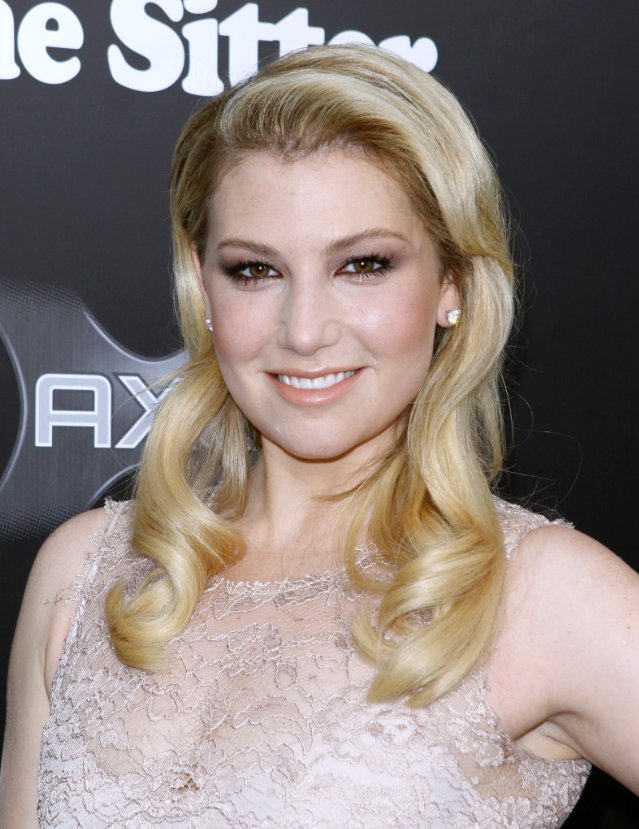Shades of Graynor

ABOVE: ARI GRAYNOR AT THIS WEEK’S PREMIERE OF THE SITTER
The characters played by actress Ari Graynor can rarely be described as “quiet”—she’s played selfish party girls in both Nick and Norah’s Infinite Playlist and The Sitter, out today; and her character in Whip It was named Eva Destruction—but it would be appropriate to describe Graynor’s Hollywood ascent as a quiet, confident one. With a string of hilarious supporting roles over the last few years, Graynor has steadily built her cachet as one of the few funny women who can hold her own with actors like Michael Cera and Jonah Hill. Those paying attention won’t have been surprised when this year’s Sundance lineup, announced this week, prominently featured two of Graynor’s roles: a co-starring turn in Rashida Jones’ Celeste and Jesse Forever, and her first lead role, in much-anticipated phone-sex comedy For a Good Time, Call….
The Sitter opens on Graynor on the receiving end of what appears to be very satisfying oral sex from Jonah Hill; afterward, she fakes sick so as not to have to reciprocate and kicks him out of her house. She only gets more selfish—and funnier—from there. Interview talked to Graynor about fake breastfeeding, women in comedy, and what’s in store for her in the near future.
ALEXANDRIA SYMONDS: Hi Ari! So I hope it’s not bad to say this, but your character in The Sitter, Marisa, is kind of the worst.
ARI GRAYNOR: Marisa is pretty much the worst person of all time, which made her so very, very fun to play. But she definitely is the last person you would want to be in any kind of relationship with, I would say, romantic or otherwise.
SYMONDS: [laughs] I assume that you are probably not as bad a person as she is. How did you get into that headspace? Did you ever find yourself wishing she was maybe a little bit more likable?
GRAYNOR: I think with a movie like this and a character like her, the best thing you can do is just dive in headfirst and go with it. The script was very fun, and that first scene has been considerably cut down in the film, but in the script it’s about seven pages long, which is almost unheard of.
SYMONDS: [laughs] Oh my God, you poor thing.
GRAYNOR: So you really got this great sense of who she was and what was going on with her, and originally there was all this sort of backstory about her previous relationship and her and Noah. With a character like that, it’s so delicious. It felt like a waste of time to be concerned about whether she was likable or not, and just try to be true to who she is in this story and the kind of story we were trying to tell. I just had a great time doing it. And she ended up saying things like “cool beans,” unironically, which was also very fun.
SYMONDS: I think Marisa’s relationship with Noah is funny in part because it’s so familiar. I think most people have experienced that at some point, being on one end or the other of a super-unbalanced relationship.
GRAYNOR: It’s true! Obviously their relationship is very funny, and I joke that she’s a terrible person—but at the same time, she’s essentially using Noah as an emotional crutch because she has such deep insecurities and heartache left over from Ricky Fontaine, who you meet later in the film. And it’s not to excuse her, but it’s true, I think in a lot of ways it is a very familiar setup of an unbalanced relationship and both people—Marisa and Noah—are sort of involved for their own selfish reasons. Even though Noah is a much nicer guy to her, he is certainly getting his own sense of validation out of it as well.
SYMONDS: Have two guys ever fought over you?
GRAYNOR: [laughs] Well, not in a fight at a party. Maybe they’ve emotionally fought for me.
SYMONDS: No one’s ever gotten knocked out?
GRAYNOR: Not physically at a party in New York.
SYMONDS: That probably says a lot about you as a person.
GRAYNOR: Although, you know what, you never know. Here’s hoping.
SYMONDS: Did you babysit when you were younger?
GRAYNOR: I did babysit a little bit when I was young. I prefer babysitting for babies. I always loved babies. I was not as great with kids that wanted to be entertained and that wanted to talk. I was more of the kind of babysitter that liked holding the baby, sort of playing Mom, and then putting the baby to bed and watching TV while eating everything in their kitchen.
SYMONDS: [laughs] With babies it’s so easy, too, because it’s like, there’s one of three options of what they need. With children, it’s harder to tell what they want.
GRAYNOR: Yeah, it’s a lot more work. I was the kind of kid that always loved babies. I was, you know, four years old, and I would have my baby doll that I would bring with me everywhere and fake breastfeed on the beach and diaper. So I had this very sort of maternal instinct very young, but I don’t love “kids” kids. Or at least I didn’t. I have to say, I haven’t spent that much time around kids, although the kids in the movie were really fun.
SYMONDS: This is a kind of complicated question, I guess, but with movies like Whip It, and Youth in Revolt, and Nick and Norah, and now this—they all kind of, it seems like, fit into this alternative-comedy thing, rather than like a Katherine Heigl movie. But it seems like there’s also a lot of cross-pollination with some of the bigger commercial movies too, like Jonah Hill has worked with Adam Sandler. So do you see the comedy scene as being one big organism, or are there different factions? Do you hang out with your co-stars from these movies?
GRAYNOR: I do. I think the world of comedy is a relatively small community, and especially for women in comedy, there just aren’t that many people involved. Certainly Apatow was such a huge influence and kind of major headliner in bringing so many of those guys together who went off on their own and have started being so successful as writers and producers and stars on their own right. You mentioned some of the Katherine Heigl vehicles—it feels like there’s sort of two worlds of comedies, where the division lies in sort of the romantic-comedy world versus the “comedy” comedy world. I think it’s because in romantic comedies, the romantic element of the story is more of the focal point, and the laughs are coming from a different place. They’re coming from a different place in the story; they’re geared often towards a different audience.
For me, it’s not gender specific. For me, it’s just appreciation of humor, and humor is subjective, but I just go towards what I find is funny, and also I want to work with the best people I can. Working with David Gordon Green, and Jonah Hill, and Michael Cera, and Drew Barrymore, and all of those people—those are the best people in comedy to work with. Anna Faris. You know, that’s my goal, to keep learning and to just keep working with the best people I can. And yeah, we do all hang out, and we all kind of know each other. It can be getting drinks, it can be hanging out, it’s just very normal things that friends do together.
SYMONDS: The attention that’s been paid in the press over the last couple years to the idea that women maybe can be funny—how have you, as a female comedic actor, responded to that kind of stuff? Does it just annoy you, or are you grateful that maybe because of that kind of press, people are paying more attention to you?
GRAYNOR: I think it’s a positive thing that people are discussing women in comedy and are starting to support comedy from women in the way they support it from men. The annoying and frustrating thing is, it’s just hard to make a good movie. I think that’s much more the issue than “who can be funny, a man or a woman.” I think if they were able to bottle up the recipe of how to make a funny movie that everyone loved and made these jillions of dollars, everyone would be doing it. It’s just a very hard thing to do, because, filmmaking in general—and when you add comedy into the mix, because it is so subjective, and specific, and oddly technical, and has to be true and honest, you’re layering on so many factors.
And then just what it is to make a film, the editing process, and the shooting it, and the publicity machine behind it, there’s so many factors involved that I think it’s just incredible when anything does well. I loved Bridesmaids, I love Kristen Wiig personally and professionally, and I’m so excited that that has opened some doors for all of us, but again I think the bigger issue is just how you get the magic sparkle dust in the air to have everything come together for a great movie. And with a comedy there’s just more involved, in a way, than there is with a dramatic piece, because comedy is so subjective. But I’m very excited to have two films that are going to be at Sundance this year. One is called, For a Good Time, Call…, that I starred in and also produced, written by two women, Lauren Miller and Katie Anne Naylon. Lauren Miller is also in the movie. She also happens to be married to Seth Rogen, so sort of a funny female comedic circle there. That’s about a female friendship/love story set in the world of phone sex. And then this other film called Celeste and Jesse Forever that Rashida Jones and Will McCormack wrote. They’re two very different styles of comedy, and they’re two totally different movies. Celeste and Jesse is also very heartbreaking, at the same time. But it’s empowering to be around ambitious, smart, talented women, and we all, men and women alike, just want to do good work. That’s the bottom line.
THE SITTER IS OUT IN THEATERS TODAY.






